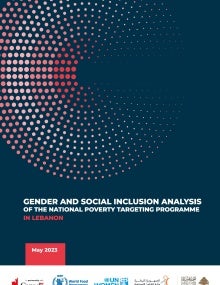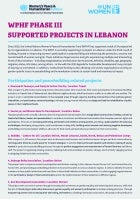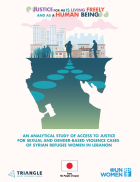1 - 4 of 4 Results
Date:
Since 2020, the United Nations Women’s Peace & Humanitarian Fund (WPHF) has supported a total of 24 projects led by 31 organizations in Lebanon. WPHF is currently supporting 12 projects in Lebanon in 2023/24 under the third round of funding, focused on improving women’s participation in peacebuilding and enhancing the protection, security and mental health of women and girls. These initiatives target women and girls experiencing multiple and intersecting forms of discrimination in line with the 2030 Agenda for Sustainable Development’s key principle of leaving no one behind. In Addition, institutional funding is also allowing civil society organizations working on gender-specific issues in peacebuilding and humanitarian contexts to sustain itself and maximize its impact.
Date:
The Gender Statistical Profile (GSP) is an annual publication of the UN Women Country Office of Lebanon. It is co-branded with Gender Working Group as a collaborating partner and Sweden as the funding partner. The GSP provides an overview of gender statistics across thirteen areas related to global normative framework and indicators across the humanitarian, development and peace nexus.
Date:
Since 8 October 2023, the spillover effects of the exchange of fire at the Lebanese southern border has led to killing and injuring of civilians in the south of Lebanon and the internal displacement of 58,835 residents from South Lebanon (as of 9 December 2023). To shed light on how women have been affected by the conflict, and their ability to assist in local crisis response, UN Women Lebanon and its partners have worked together to provide this Gender Alert amid the ongoing security and humanitarian crisis in south Lebanon. The findings provide observations on relevant gender equality issues to help UN Women and the humanitarian community pinpoint crucial areas of humanitarian response to incorporate into emergency preparedness and response planning.
Date:
The aim of the study is to understand the pathways that Syrian refugee women utilise to access justice for SGBV cases in Lebanon, both in the state legal and judicial system (formal) and within community-based mechanisms (informal). Focus is given to unpacking the informal justice landscape for Syrian refugee communities, given the limited concrete documentation of community-based dispute resolutions and related practices specifically for SGBV issues.




